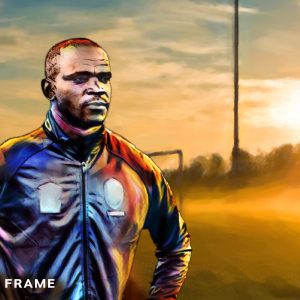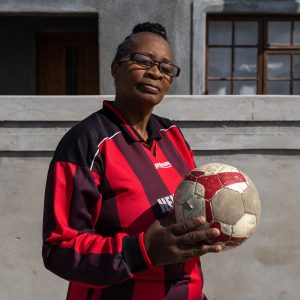Sport in Africa after Covid-19
The coronavirus has brought every sphere of life to its knees and sport is no exception. Experts offer ways for sport on the continent to come out of the pandemic stronger than before.
Author:
23 October 2020

As the world attempts to pick up the pieces of Covid-19, it is clear that almost every sphere of life has been permanently altered in seismic ways.
Economies have borne the brunt of abrupt lockdowns necessitated by the physical distancing protocols advised by the World Health Organization. In Africa, where resources are already stretched thinly, the prognosis for the future of sport is decidedly grim. The suspension of play came with a large financial burden. And as a semblance of normality returns, another is being placed on clubs and associations in the form of regular coronavirus testing of their athletes.
“Sport in Africa relies a great deal on government support and very little on the private sector,” says media and analytics company Digital Sports Africa chief executive Emeka Enyadike. “With the pandemic, there is a huge shift because a lot of the governments around Africa have to focus on health and other challenges.”
With the more pressing matters of public health and economic recovery to oversee, it is inevitable that sport will be pushed to the back of the queue when it comes to financing. “When you look at the global economic outlook, it’s not very promising, particularly for governments that are dependent on the revenues they get from [natural] resources,” Enyadike says.
Disruption in the sporting calendar
For sport all over the world, 2020 was slated to be a big year. Instead, a raft of cancellations and postponements have followed the spread of Covid-19 and this has already had far-reaching consequences on sport in Africa.
The 2020 Tokyo Olympics, despite keeping the name for marketing purposes, will now be held from 23 July to 8 August 2021. The International Olympic Committee said this decision was made to “protect the health of the athletes and everyone involved”, help contain the spread of Covid-19 and “safeguard the interests of the athletes and of Olympic sport” with an eye on maintaining the integrity of the “global international sports calendar”.
This announcement, sensible as it is, affected athletes’ training schedules. “Next year happens to be the World Championships,” Nigerian sprinter Divine Oduduru said in an interview on Guardian TV. “How are we going to have them both in the same year? That shows the calendar has already been tampered with and everything will have to change.”
Related article:
Oduduru is among the few on the African continent who aren’t reliant on government funding. In January, he signed a sponsorship deal for the Olympics with financial services company Visa.
However, even private-sector sponsorship will take a massive hit. Losses in revenue across the board as a result of the Covid-19 pandemic will no doubt force companies to cut their spending. Advertising budgets are usually the first to be reviewed. Without meaningful return on their outlay owing to the freeze on top-level sport, it is difficult to justify continued involvement.
Opportunity to tap other markets
Reactions to the state of affairs within the sports sector in Africa are decidedly mixed.
As Liberia’s President George Weah noted, “The lifeblood of sports consists mainly of attendance fees and sponsorships.” In his view, without the availability of match-day revenue, a return to any kind of normalcy is impossible to envisage.
“It is my considered opinion that the future of sports in Africa after Covid-19 is bleak, and is not guaranteed to recover. There will be an urgent need to resuscitate football and other games.”
However, there is also some reason for optimism. And the consensus seems to be that the current situation, unprecedented as it is, offers the opportunity for a drastic rethink.
Related article:
“It could also be an opportunity for sports because it then means sports administrators will have to find a way out by exploring new ways to fund their activities and competitions,” says Japhet J Omojuwa, an author and behaviour change expert. “The onus is on these administrators to create the products and services that’d motivate private money to see sports as viable enough to drive their own agenda.”
Sports media consultant and head of sport at the South African Broadcasting Corporation Gary Rathbone agrees with Omojuwa’s assessment. He points to the digital space as an area ripe for exploration by African sports administrators.
“My feeling is that African sport needs to really start exploring the opportunities that exist in the OTT [over-the-top media service] space, and especially the mobile space,” says Rathbone.
“I think the idea of creating digital content, or content that is available on digital distribution platforms – of their leagues, of their matches, of their tournaments – is a great way to start monetising it outside of the opportunities that used to exist on the pay-TV broadcast.
“I believe those opportunities are going to fade away. Pay-TV broadcasters aren’t going to be in a position to start paying huge amounts of money for local content anymore, so the opportunity is going to be there for local sports events, leagues, federations to create content and distribute it through digital platforms like mobile, streaming to mobile, online… that sort of thing. That way, they can monetise that content directly from fans who will obviously pay to access that content, or from advertisers.
“Major football clubs in Africa, for instance, really should be doing more to leverage their digital presence on social media. Think how much a club with over a million fans could generate simply by getting a quarter of them to subscribe to content, produced in-house, for about 50 cents every month. That would amount to R125 000 in a month. Even regular TV revenue might not have been able to offer them that much,” said Rathbone.
Related article:
Digital Sports Africa has hosted a number of workshops around this subject and Enyadike says the fact that these discussions are now being had is, in itself, a good sign. There are now more people inquisitive about the opportunities present within the digital space, and that can only be to the benefit of the sport in Africa.
“We’ve had far more engagement than we usually have in the past. Usually, you’d imagine that they would just allow sports ministers around the continent, or maybe the federation … It was seen as though only a select few had to do it. Now, all of a sudden, sports fans on the continent are asking questions.
“Despite the very bleak outlook for Africa, I believe it’s a huge opportunity for us to recalibrate, for us to reposition sports on the continent, to begin to drive toward a more commercial-driven business outlook and proper structures,” he says.
A change in leadership
Just as important as structures are the people who helm them. As a result of being viewed largely as a political tool, sport across Africa has frequently seen square pegs put into round administrative holes. It is a vacuum of leadership that has been made even starker by Covid-19.
“One thing I have always advocated throughout this pandemic, in all of the sessions I have had, is the need for us to bring in professionals,” says Enyadike.
“We have far too many politicians running sports in Africa. We need to bring in professionals, people who know what they’re doing, to come and change it. But time is running out.”
Related article:
Omojuwa also evinces the sense that the window of opportunity for this reset is a small one. He says that if sport cannot prove the relevance of its programmes, it could, like Weah says, be left behind permanently.
“We need to start out by selecting or electing the right people into these spaces,” he says. “It has to start from there. Sports is big business elsewhere and Africa has to treat it that way. To do that, we need a balance of business leaders and sportspeople to do it.
“Right now it does appear we have a combination of genuine sportspeople and journeymen running things. Something has to give this time, because global capital is now more focused than ever before.”
Why is sport so important?
In a world where public health and safety are huge priorities, it might seem perverse to fixate on sport in particular. However, despite clearly being low on the list of considerations, social development expert Rachel Aron makes the case for sport’s wider social impact.
“The sports industry has immense social value across all 54 countries,” she says. “It is the great unifier of all Africans, a great enabler in promoting peace in post-conflict countries and a great facilitator of entrepreneurship. In essence, the sports industry significantly contributes to advancing social development prospects of Africa as a continent.
Related article:
“Covid-19 has brought about a lot of significant challenges for sport in Africa. A lot of physical activity inherent in sport has been restricted. In doing so, that has affected the physical and mental wellbeing of a number of Africans across the continent.
“Also, in areas in Africa that are conflict-prone, conflict-ridden or that have emerged from conflict, one of the few outlets they have is engaging in sports, either watching or participating directly.”
Sport could play some role in Africa’s recovery from Covid-19. But to do so, it will need to evolve to remain relevant and thrive in the new normal.





